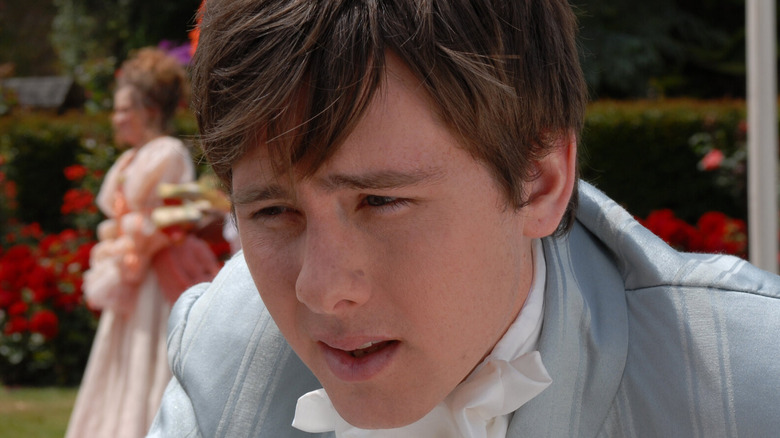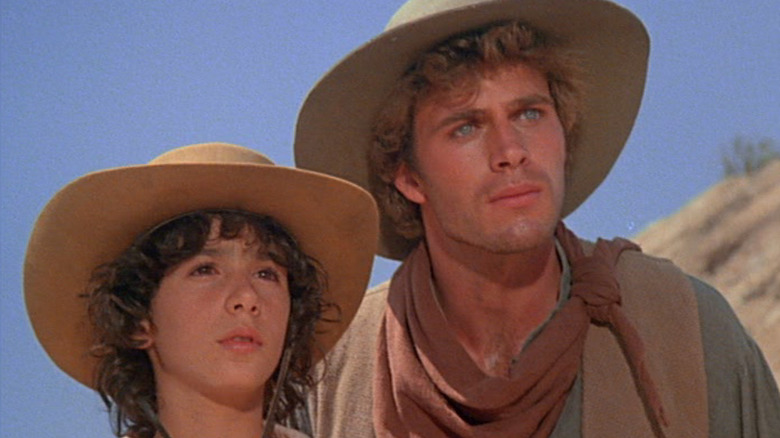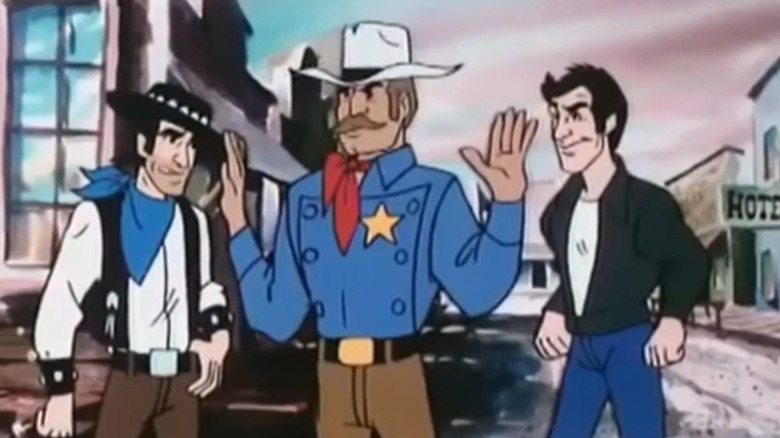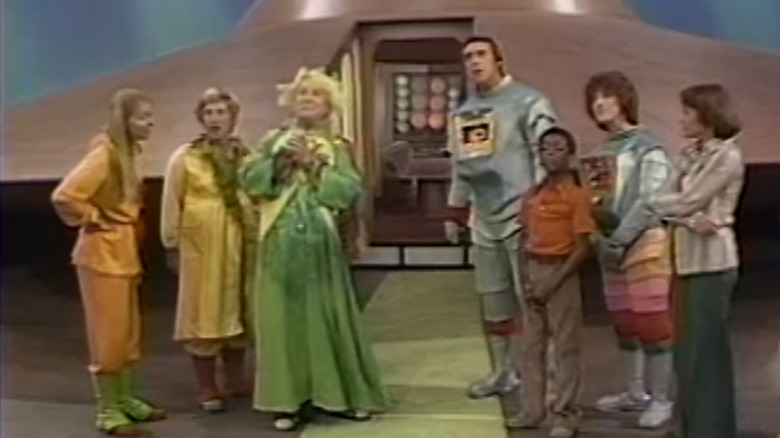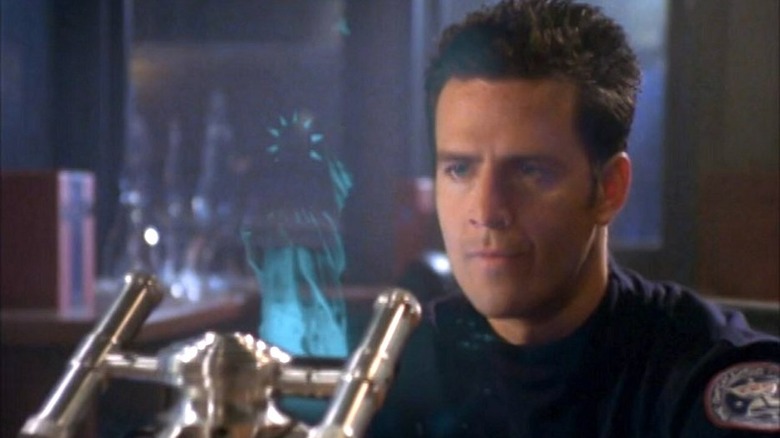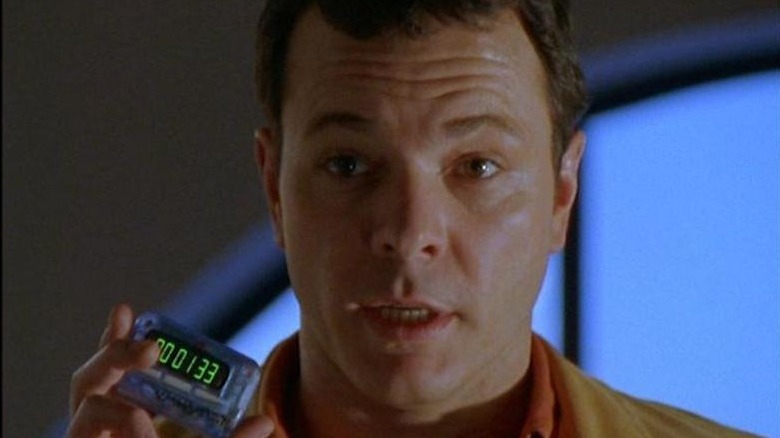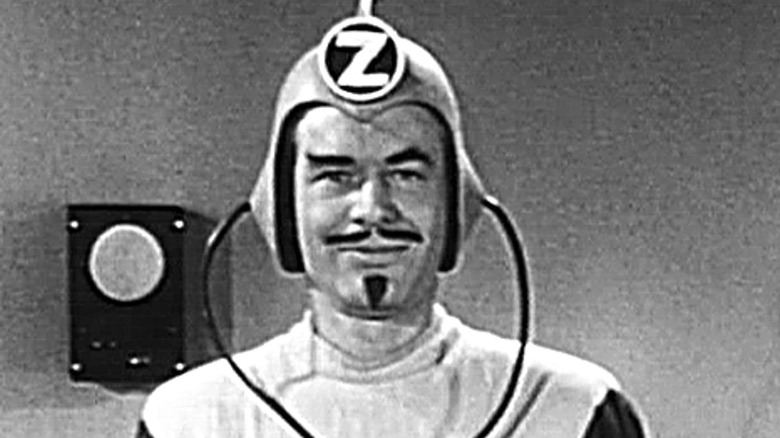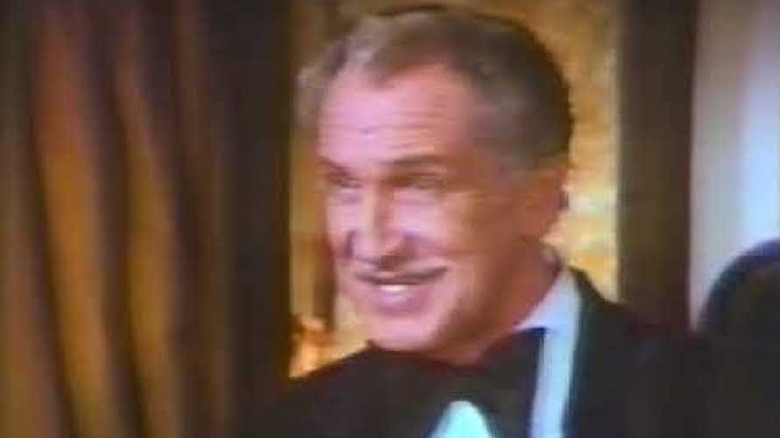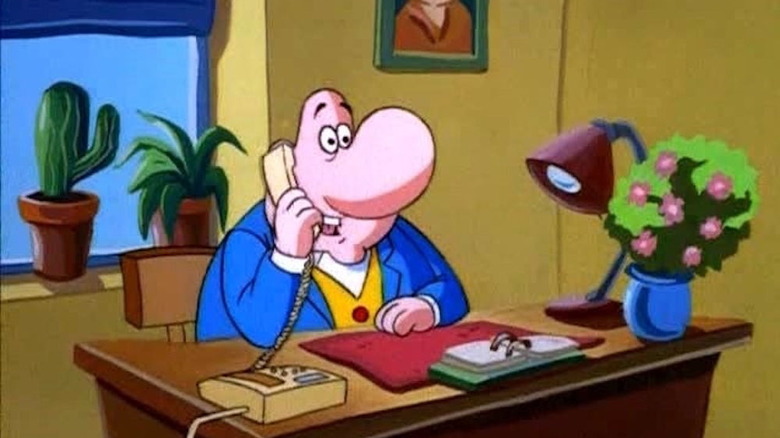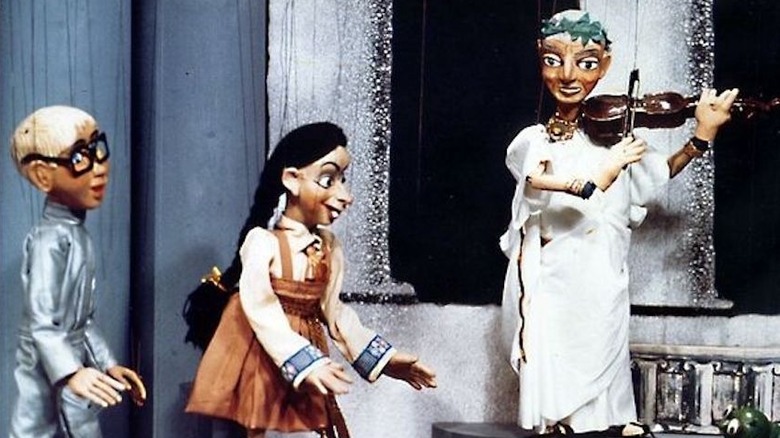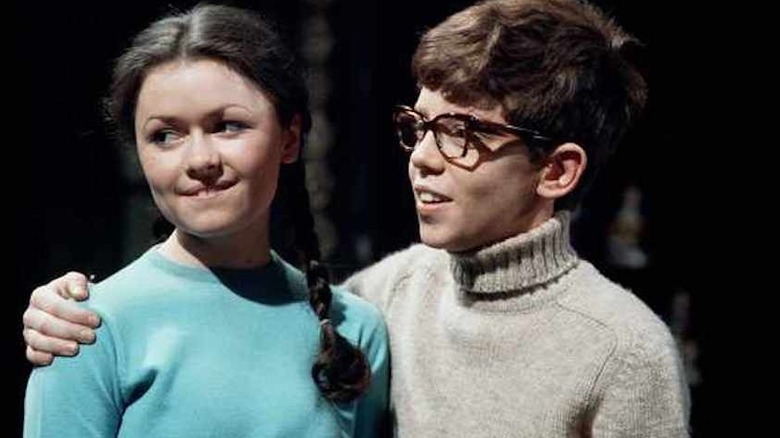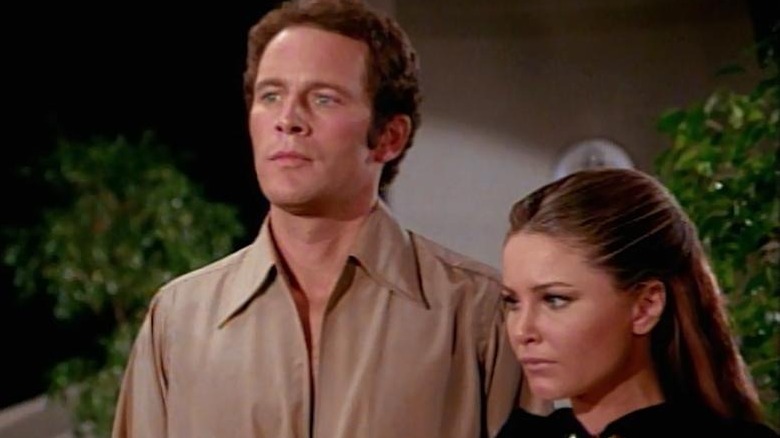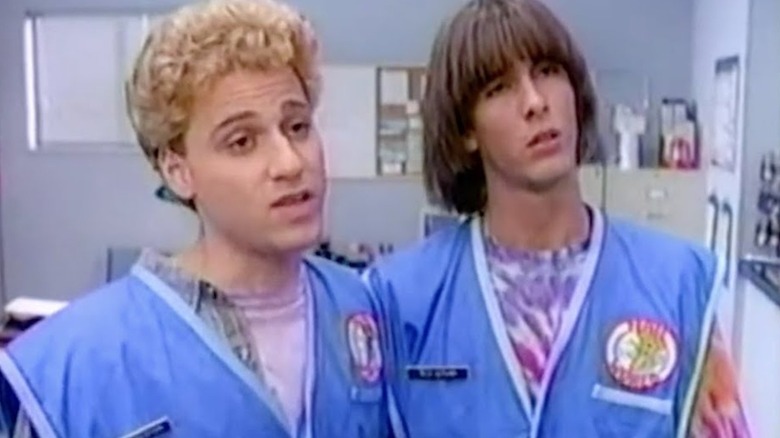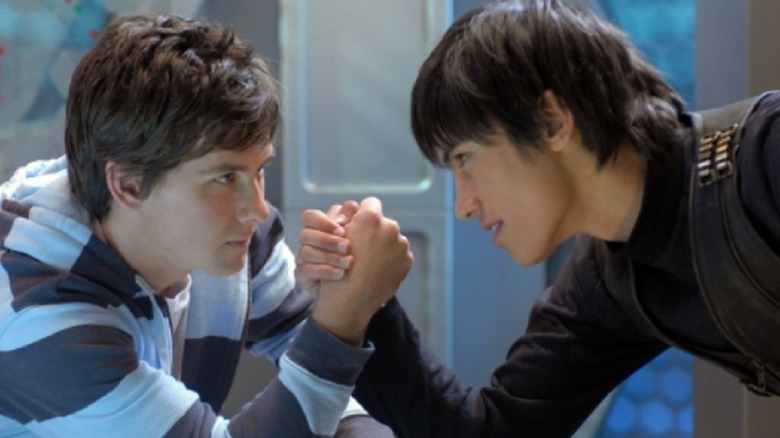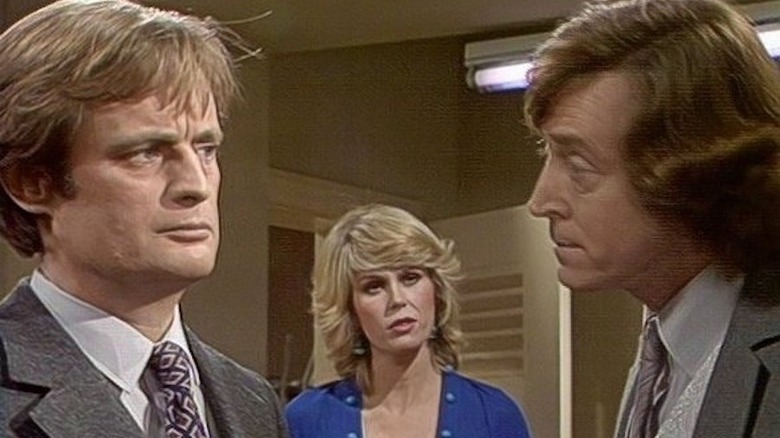Bizarre Time Travel TV Shows That Actually Existed
From "Doctor Who" to "Quantum Leap," some of the most beloved and long-lasting science fiction TV shows have centered on a hero traveling through time. A clever way of offering up unique stories week after week, it allows for new settings, heroes, villains, and problems in every episode. With a time travel device, the protagonist can alter the course of the past or future, risking unfathomably disastrous consequences if things go awry. After all, what stakes could be higher than saving all of history and time?
Despite the enduring appeal of the premise, not all shows get it right. In fact, for every time travel classic, there are many more that are too weird to stay on the air; shows so odd and ill-conceived that nobody is surprised that they barely last a single season. On paper, some of these shows seem mildly intriguing, and probably would have succeeded had they had the right cast, the right writers, and the right effects budget. Unfortunately, most of them had none of these, earning them a place on this list: the most bizarre time travel TV shows that you won't believe actually exist.
Voyagers!
Running for one season in 1982, the sci-fi adventure series "Voyagers!" starred John-Erik Hexum as Phineas Bogg, a member of a group of time protectors. In the series opener, Bogg lands in 1982 and meets a young orphaned boy named Jeffrey Jones (Meeno Peluce), a history buff with an encyclopedic knowledge of the past. When Jeffrey's dog eats Bogg's guide to history, he recruits the boy to help him on his missions.
Their job is simple with the aid of a computerized gadget called an Omni. No need for a DeLorean or police box; the Omni does it all. They use it to spot changes in the timeline and determine if history is unfolding as it should. If it's not, they can use the Omni to travel back and intervene to put right what has gone wrong.
What's bizarre about this one isn't just its stories, which see history play out in eye-popping alternate ways, including an episode where Babe Ruth and Lucky Luciano compete for the affections of Egyptian queen Cleopatra. It's also its attempt to have an educational angle despite not being very historically accurate at all, as the show's producers openly admitted. The end of every episode closes with a message telling young viewers to go to their local library if they really want to learn about the likes of Franklin D. Roosevelt or Leonardo da Vinci.
The Fonz and the Happy Days Gang
Straight from the "what were they thinking" department comes a "Happy Days" spin-off that you probably wouldn't have expected to see on this list. The classic '70s sitcom had its fair share of spin-offs, including "Laverne and Shirley" and "Joanie Loves Chachi," and even the wacky alien buddy comedy "Mork and Mindy," but it's beaten out in its weirdness by "The Fonz and the Happy Days Gang." This animated kids' adventure brought back Henry Winkler as Fonzie, Ron Howard as Richie Cunningham, and Donny Most as Ralph Malph.
Alongside a talking anthropomorphic dog named Mr. Cool — who seems like he could have inspired Poochie on "The Simpsons" — they have adventures with Cupcake, a girl from the future with a time-traveling spaceship. Over the course of its 24 episodes, the Fonz and pals meet Sherlock Holmes in 1899, the pirate Blackbeard, and author Jules Verne, all while trying to find their way back to 1957 Milwaukee. They wind up crashing in the Wild West, ancient Persia, and medieval Camelot, where they hang out with King Arthur.
Perhaps the most unusual spin-off of a hit show you'll ever see, it actually might not be the worst entry on this list. In the writers' defense, it was 1980 and they were likely sky-high on disco and awesome sauce.
The Lost Saucer
If you're looking for something trippier than "The Fonz and the Happy Days Gang," you might find it in "The Lost Saucer," from the minds of Sid and Marty Krofft. The 1970s production power duo was responsible for some of the weirdest and wildest TV shows around, including "H.R. Pufnstuf" and "Electra Woman and Dyna Girl." This 1975 single-season oddity took the time-traveling premise of their "Land of the Lost" and tossed it in a blender with "Lost in Space" and a dash of mind-altering hallucinogens.
Instead of depositing its cast in a new time period for its whole run, "The Lost Saucers" chronicled the time-traveling exploits of two androids from the 24th century named Fi and Fum, played by TV comedy stars Ruth Buzzi ("Laugh-In") and Jim Nabors ("The Andy Griffith Show"). Visiting Earth of the year 1975, they pick up young Jarrod Johnson for an adventure. His babysitter Alice tags along. They're also joined by a half-dog, half-horse creature called a Dorse. This might sound too bizarre to believe, but if you're familiar with the Kroffts, you'll know this is par for the course.
Once again, their time saucer is malfunctioning and unable to get the 20th-century road-trippers home. They end up in all different times in an effort to get them back. The show is more than just a history lesson; many episodes actually find the group landing in various distant futures and include strong social allegories with moral messages.
Timecop
Adapted from the big screen sci-fi thriller of the same name starring Jean-Claude Van Damme, "Timecop" aired on ABC in the late 1990s. It centered on agents of the Time Enforcement Coalition, including agent Jack Logan (Ted King), who traveled through history stopping criminals who were trying to alter the past. The series premiere had him following a mystery villain who continued the path of Jack the Ripper, and subsequent episodes visited vaguely more contemporary eras like 1920s Chicago, 1970s New York, and 1980s Los Angeles.
On paper, it's a decent concept for an ongoing series, but it's let down by amateurish writing, a lackluster cast, and surprisingly cheap-looking sets, even compared to its low-budget big-screen counterpart. Flat, soap opera-like cinematography and a dimly lit visual style that may have been designed to hide its low budget don't help matters. While no one would ever describe Jean-Claude Van Damme's performance in the 1994 film version as awards-caliber, Ted King is somehow even worse; without JCVD's charm and charisma, he's lifeless and stiff in the role.
Amazingly, as weird and awful as the 1997 series is, it didn't entirely kill the "Timecop" franchise, and some half-decade later a direct-to-DVD film sequel materialized starring Jason Scott Lee.
Crime Traveller
Many time travel shows have landed on British dials over the decades, with the 1997 series "Crime Traveller" being just one example. Landing the same year as "Timecop," it followed the adventures of the eye-rollingly-named John Slade, a gutsy detective of the 'shoot first and ask questions later' mold a la Sylvester Stallone in "Demolition Man." But like Stallone's Spartan, Slade has a fresh-faced female officer by his side in the form of Holly Turner, who just so happens to have a time machine in her apartment.
Part "Minority Report," part "Quantum Leap," the concept is that the duo uses the time machine to go back into the past and find out who committed the crimes they're trying to solve. Of course, they are also tempted to change history and inevitably become part of it in trying to prevent a crime or two.
Produced just a year after the failed attempt to revive "Doctor Who," the series could be seen as an attempt to put a fresh twist on the time travel formula. While the series has its charms, and may even be somewhat underrated, it was full of one too many weird plot contrivances, clichéd stories, and predictable premises to turn into the next big British franchise. Creator Anthony Horowitz reportedly believed its lack of success was due to behind-the-scenes problems at the BBC (via Den of Geek).
Captain Z-Ro
One might argue that the BBC had been inspired by "Captain Z-Ro" — which aired in 1951 — when it crafted the iconic sci-fi series "Doctor Who" more than a decade later. The titular hero was a similarly concerned meddler in historical events, much like early episodes of the British classic, in a series that was as much an educational trip through time as it was an entertaining kids' series. Yet again we meet an intrepid time traveler, this time in classic 1950s spaceman garb, complete with a goofy helmet with a letter "Z" on it to make sure everyone knows that yes, he is in fact Captain "Z"-Ro.
Like the Doctor, Z-Ro has a time-traveling device called the ZX-99, but this one is in his super secret science laboratory. It peers into the past so he can see if time is flowing correctly; if not, he jumps through and nudges it in the right direction. Z-Ro has a child sidekick, the teenaged Jet, who helps him keep history moving properly, meeting such famous faces as Attila the Hun, Robin Hood, and Benedict Arnold.
A silly serial, it's very much of its day, with effects that are anything but special, and no real thought put into the logic of time travel or its history-changing stories.
Time Express
Perhaps inspired by 1960s hits "The Love Boat" and "Fantasy Island," the bizarre time travel series "Time Express" saw a cast of characters sending a new group of guest stars on a trip through history in every episode, making it somewhat of an anthology. The series' big draw was horror icon Vincent Price, who starred as a train master who helped aid the guests on their time-hopping escapades. Each week a new group would revisit a classic time period and live out events there, usually changing history, and returning home in the closing moments to witness the consequences, usually with a mind-bending twist or ironic result a la "The Twilight Zone."
Each episode features two separate tales, and there were some decent guest stars, with Jerry Stiller, Lee Meriwether, John de Lancie, and Morgan Fairchild making appearances. Sometimes the stories feature a character with a major regret looking to change his own past, while others want to go back in time to save a loved one from meeting a horrific fate or change the outcome of a big life event. That's basically it, as there were only four episodes produced of the series, as it proved so terribly boring — and unsuccessful — that it was canceled before any further were filmed. In the end, it's a drab, dreary affair with little going for it but Price's inimitable introductions.
Walter Melon
A superhero who can travel through time might seem like a recipe for a can't-miss kids' show. As an animated series, it could go anywhere, any time, within any budget, and its hero could face off against the most bombastic villains a writer could imagine. That's why it's so perplexing that "Walter Melon," a British series that aired in 1997 for a single season, failed so spectacularly. But watch even a short clip from any random episode and you'll see the problems right away.
The premise of "Walter Melon," very loosely based on the Franco-Belgian comic "Achille Talon," follows the goofy titular Walter Melon, who takes the place of famous heroes when they can't do the job themselves. He steps in for the likes of Batman, Indiana Jones, Captain Kirk, and even Pete Mitchell from "Top Gun." Of course, they can't use the characters directly without drawing the ire of copyright lawyers, so it's all a series of pointed spoofs and homages.
In its second season — yes, this one got a second season — the show was retooled into an educational series of sorts. After that, Melon found himself stepping in not for famous fictional heroes, but real-life historical ones, including Thomas Edison, George Washington, and Christopher Columbus. Though it's not the worst cartoon series you'll ever see, the oddball cast of main characters and the confusing premise make it one of the most bizarre for sure.
Jimmy Green and His Time Machine
If you're looking for something truly unconventional, get ready for our next entry, the nearly forgotten British children's puppet show, "Jimmy Green and His Time Machine." Not only is this series led by a cast of classic string-controlled wooden puppets, but their unique design will also either have you laughing or screaming, depending on whether you find their distinctive visages charming or creepy.
This 13-episode series of 13-minute shorts aired on ITV in 1968. It saw the eponymous Jimmy Green using his time machine to travel to important historical events along with his two friends, Lettice and Maggot. Yes, you read that correctly. Though none of the series has apparently survived — it's believed that it aired live and was never recorded (via Aetherco's Timelinks) — we do know that the characters were worked by puppeteers Eric Bramall and Chris Somerville, who originated with the Harlequin Puppet Theatre in North Wales. That same duo did a handful of other similarly odd programs, with names like "Sugarball: The Little Jungle Boy," "Hubble Bubble," and "Mr. Trimble."
As for the adventures of Jimmy Green, his visit to Rome saw him meet Nero, who of course played his fiddle while the city burned around him. This is the only episode we could find any reference to (via Nostalgia Central), but perhaps that's for the best given how bizarre the show seems to have been.
Timeslip
A forgotten 1970 British original, "Timeslip" was the rare series in its era not to feature any adults, with shows like "Doctor Who" and "Voyagers" using teens and children as sidekicks. Here, the main cast consists of two pre-teens, Simon Randall (Spencer Banks) and Liz Skinner (Cheryl Burfield), a pair of kid adventurers who discover a strange doorway in time situated at a nearby naval base. Aided by a mysterious man named Traynor, they hop back in time for various harrowing tales. As the danger escalates, they realize that there is more to Traynor than meets the eye.
Impressively written and surprisingly mature given its intended audience, the series consisted of four multi-part stories totaling 26 episodes. A story involving a jump forward in time where Liz meets a terrifying adult version of herself proved chilling, while a desolate alternate future feels hauntingly prescient for a children's series in the early '70s. Meanwhile, the ongoing story arc provided plenty of genuinely surprising twists and turns, including a recurring character revealed to be an insidious clone.
Not the clunker that many on this list are, it was a wonderfully weird series. Unfortunately, it only lasted a single season, though looking back it may have deserved more.
Fantastic Journey
Unlike most time travel shows, the heroes at the center of "Fantastic Voyage" have no time machine or other device that allows them to jump through time. It still manages to take its weirdness to a whole other level. Notable for featuring "Planet of the Apes" alum Roddy McDowall in the cast, the show's behind-the-scenes crew included producers and writers of "Star Trek," "The Wild, Wild West," and "Wonder Woman." It aired in the spring of 1977.
The show begins with a family of scientists on an ocean voyage for a new research mission. They become trapped in the Bermuda triangle and stranded on a strange deserted island. There they meet Varian, a man from the 24th century who explains that the island is a mysterious nexus point between time periods, where people from different points in history — past and future — now reside. They travel to the different zones on the island through strange portals that take them back and forth while they seek the Evoland, a place where the only way home can be found.
Over the course of its brief run, the clan encounters the people of Atlantis, who built a new world for themselves; an idyllic society of androids; a land of children ruled over a schoolyard bully; and everyone from werewolves and sorcerers to interstellar despots. That's just during its single season of 10 episodes. One highlight is its impressive roster of guest stars, which included Cheryl Ladd, John Saxon, and Joan Collins.
Bill & Ted's Excellent Adventures
Based on the success of the feature film "Bill & Ted's Excellent Adventure," which had a clever concept and plenty of off-the-wall antics, a live-action TV adaptation shouldn't have been hard to pull off. The series once again saw the two goofy, boneheaded rock fans turned time travelers aided by Rufus. However, in its move to an ongoing series, it goes from a breezy, light-hearted adventure to a total bore. The visual gags and repetitive in-jokes get old fast, while the formulaic plots do nothing to help.
Of course, arriving on TV screens before the big-screen sequel "Bill & Ted's Bogus Journey" and after a failed attempt at an animated adaptation, this live-action, small-screen series was likely little more than a cheap cash-in. Poorly produced and hastily assembled, the show's writers clearly didn't understand the characters, who were neither lovable nor endearing like their Hollywood counterparts. Keanu Reeves, Alex Winter, and George Carlin did not return, and recasting the roles proved challenging. The result was a new cast with none of the chemistry that was so essential to the appeal of the films. It was promptly canceled after seven episodes.
Time Trackers
We've gone to the UK for a few bizarre time travel shows, but the 2008 teen action drama "Time Trackers" comes to us via the land down under. Airing in Australia for 13 episodes, the series was focused on three young adventurers, each from different time periods. First is the 15-year-old space captain Wiremu Love. He takes his time ship to 2008, where he meets wunderkind Troy, before zipping back a few million years and recruiting a nearly feral cave-girl named Carmen.
Together, the three new time-hopping friends travel the time stream in an overly and unnecessarily confusing ongoing series of adventures to stop so-called "time-viruses" that are disrupting history. These insidious MacGuffins edit the past to remove inventions or artworks that are integral to the flow of history. It's up to these children to put things right. This means getting Galileo to invent the pendulum clock, giving Gutenberg a reason to create the printing press, and convincing da Vinci to paint the woman who would become the subject of the Mona Lisa. They are even once mistaken for gods by Isaac Newton when their mission to get him to discover gravity goes wrong.
All the while, a serialized story plays out involving the Council of the Future that eventually escalates into an all-out time war. If you want a series with a concept sure to bewilder, this one is it, mate.
Sapphire and Steel
Back in the UK, "Sapphire and Steel" was another time travel series that felt like a possible attempt to capitalize on "Doctor Who," which, by the late 1970s, was enjoying tremendous success. In fact, the series' creator, Peter J. Hammond, eventually went on to work on "Who," including the mid-'80s classic serials and, decades later, the spin-off series "Torchwood."
But in 1979, he launched this series about a pair of extra-dimensional operatives locked in an endless struggle with mysterious and diabolical forces that threaten all of time.
Like "Doctor Who" with bigger stakes and an ongoing story — more like what it is today, in fact — "Sapphire and Steel" centers on Joanna Lumley ("Absolutely Fabulous") as Sapphire and David McCallum ("The Man From U.N.C.L.E.") as Steel. Though a forgotten relic today, the series enjoyed three seasons and 34 episodes. Its popularity didn't mean it wasn't one of the weirdest shows on the dial. A complex mythology to rival "Battlestar Galactica" made the series both trippy and intriguing. Its lore involved a universal time tunnel that controlled the flow of history, while sudden cracks in the walls were threatening reality.
Through these cracks, all manner of bizarre and captivating story set-ups take shape, with a variety of strange beings emerging. As smartly written as classic "Star Trek" with a strong cast and an impressive list of guest stars, this is one entry that we can recommend to viewers who may be looking for a hidden gem.
